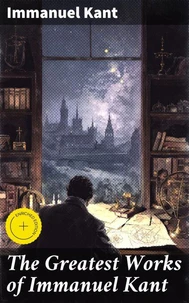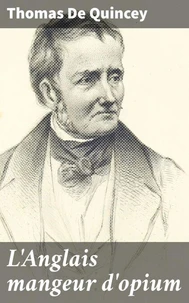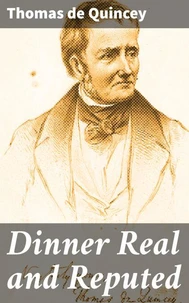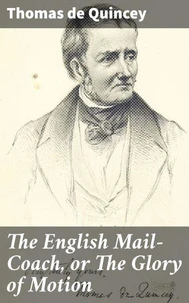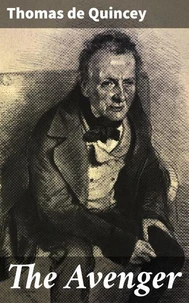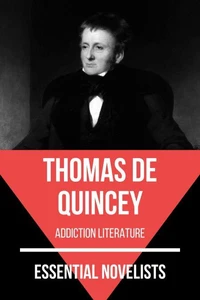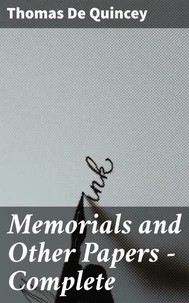Autobiographic Sketches. Exploring the Depths of Human Psyche: Essays on Identity and Experience
Par :Formats :
Disponible dans votre compte client Decitre ou Furet du Nord dès validation de votre commande. Le format ePub est :
- Compatible avec une lecture sur My Vivlio (smartphone, tablette, ordinateur)
- Compatible avec une lecture sur liseuses Vivlio
- Pour les liseuses autres que Vivlio, vous devez utiliser le logiciel Adobe Digital Edition. Non compatible avec la lecture sur les liseuses Kindle, Remarkable et Sony
 , qui est-ce ?
, qui est-ce ?Notre partenaire de plateforme de lecture numérique où vous retrouverez l'ensemble de vos ebooks gratuitement
Pour en savoir plus sur nos ebooks, consultez notre aide en ligne ici
- Nombre de pages363
- FormatePub
- ISBN4057664618139
- EAN4057664618139
- Date de parution25/11/2019
- Protection num.Digital Watermarking
- Taille618 Ko
- Infos supplémentairesepub
- ÉditeurGOOD PRESS
Résumé
In "Autobiographic Sketches, " Thomas De Quincey presents a rich tapestry of his life, marked by a keen introspection characteristic of Romantic literature. This collection serves not only as a memoir but also as a philosophical reflection on the nature of memory and identity, blending lyrical prose with vivid imagery. De Quincey's distinctive style captures the tumult of his experiences, from his childhood in Manchester to the opium-fueled ruminations of his adult life.
His exploration of addiction and artistic creation resonates with the existential inquiries prevalent during the early 19th century, positioning the sketches within a broader literary and cultural context that grapples with the human condition. Thomas De Quincey, a key figure in English Romanticism, is best known for his confessional writing and deep engagement with opiates, which profoundly influenced his creative output.
His early exposure to literature and philosophy, coupled with personal tragedies and health struggles, shaped the narrative lens through which he examines his past. As a contemporary of Coleridge and Wordsworth, De Quincey's work often intertwines personal experience with broader intellectual movements, offering deep insights into the psyche of his time. "Autobiographic Sketches" is highly recommended for readers interested in the intersection of autobiography and literary expression, as well as those drawn to the complexities of the human experience.
Through De Quincey'Äôs poignant reflections, readers are invited into a fascinating dialogue between life and art, allowing for a profound understanding of not only the author'Äôs inner life but also the societal influences of his era.
His exploration of addiction and artistic creation resonates with the existential inquiries prevalent during the early 19th century, positioning the sketches within a broader literary and cultural context that grapples with the human condition. Thomas De Quincey, a key figure in English Romanticism, is best known for his confessional writing and deep engagement with opiates, which profoundly influenced his creative output.
His early exposure to literature and philosophy, coupled with personal tragedies and health struggles, shaped the narrative lens through which he examines his past. As a contemporary of Coleridge and Wordsworth, De Quincey's work often intertwines personal experience with broader intellectual movements, offering deep insights into the psyche of his time. "Autobiographic Sketches" is highly recommended for readers interested in the intersection of autobiography and literary expression, as well as those drawn to the complexities of the human experience.
Through De Quincey'Äôs poignant reflections, readers are invited into a fascinating dialogue between life and art, allowing for a profound understanding of not only the author'Äôs inner life but also the societal influences of his era.
In "Autobiographic Sketches, " Thomas De Quincey presents a rich tapestry of his life, marked by a keen introspection characteristic of Romantic literature. This collection serves not only as a memoir but also as a philosophical reflection on the nature of memory and identity, blending lyrical prose with vivid imagery. De Quincey's distinctive style captures the tumult of his experiences, from his childhood in Manchester to the opium-fueled ruminations of his adult life.
His exploration of addiction and artistic creation resonates with the existential inquiries prevalent during the early 19th century, positioning the sketches within a broader literary and cultural context that grapples with the human condition. Thomas De Quincey, a key figure in English Romanticism, is best known for his confessional writing and deep engagement with opiates, which profoundly influenced his creative output.
His early exposure to literature and philosophy, coupled with personal tragedies and health struggles, shaped the narrative lens through which he examines his past. As a contemporary of Coleridge and Wordsworth, De Quincey's work often intertwines personal experience with broader intellectual movements, offering deep insights into the psyche of his time. "Autobiographic Sketches" is highly recommended for readers interested in the intersection of autobiography and literary expression, as well as those drawn to the complexities of the human experience.
Through De Quincey'Äôs poignant reflections, readers are invited into a fascinating dialogue between life and art, allowing for a profound understanding of not only the author'Äôs inner life but also the societal influences of his era.
His exploration of addiction and artistic creation resonates with the existential inquiries prevalent during the early 19th century, positioning the sketches within a broader literary and cultural context that grapples with the human condition. Thomas De Quincey, a key figure in English Romanticism, is best known for his confessional writing and deep engagement with opiates, which profoundly influenced his creative output.
His early exposure to literature and philosophy, coupled with personal tragedies and health struggles, shaped the narrative lens through which he examines his past. As a contemporary of Coleridge and Wordsworth, De Quincey's work often intertwines personal experience with broader intellectual movements, offering deep insights into the psyche of his time. "Autobiographic Sketches" is highly recommended for readers interested in the intersection of autobiography and literary expression, as well as those drawn to the complexities of the human experience.
Through De Quincey'Äôs poignant reflections, readers are invited into a fascinating dialogue between life and art, allowing for a profound understanding of not only the author'Äôs inner life but also the societal influences of his era.





